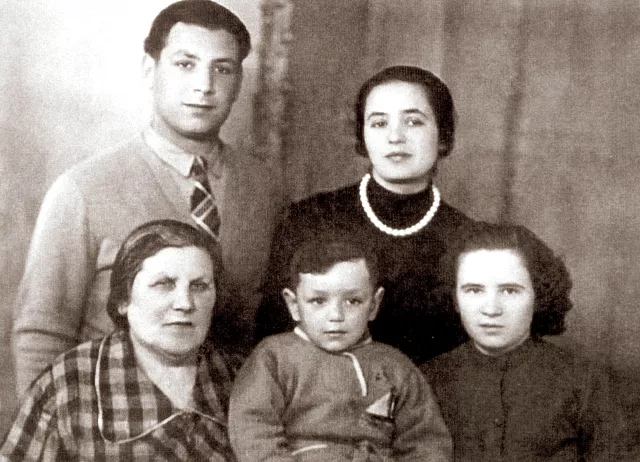A family photograph. Sitting from left to right: my mother Sosia, my older son Aron and my wife's friend. I and my wife Clara Krais are standing behind. The photo was taken on my son's birthday in Chernovtsy in 1960.
After I returned from the army in 1955 I met my future wife Clara Fishman. She was born in the town of Yedintsy in Romania in 1937. Yedintsy was a small and poor provincial town, and there was no electricity there before the war. There were many Jewish families; most of them were poor. My wife's mother, Sheyndl Fishman, was a housewife, and her father, Yankel Fishman, was a carpenter. My wife came from a typical Jewish family. Her family was very poor and religious. They celebrated Jewish holidays and went to the synagogue. My wife was raised Jewish. She completed secondary school. Clara and her parents were in the ghetto in Zatishiye village in Vinnitsa region. This ghetto was supervised by the Romanians. Clara and her parents survived the horrors of the ghetto, but they suffered from the consequences it had on their health. Clara's parents died of tuberculosis. Clara had lost them before I met her. When we met she was 18. We got married in 1955. Clara also loved my mother. We didn't have a traditional wedding. We had a civil ceremony and a small dinner at home afterwards. My mother liked my wife and treated her like a daughter. Clara finished Medical College in Chernovtsy and began to work as a nurse in a hospital in town. I worked as a driver.
My mother turned 55 in 1960 and retired. She died in 1967. We buried her in the Jewish cemetery in Chernovtsy, according to Jewish traditions. There's an engraving in Russian and Hebrew on her gravestone.
Our first son was born on 11th January 1957. We gave him the name Aron, after my wife's paternal grandfather. Our second son Michael, born on 16th July 1961, was named after my maternal grandfather. Our sons were raised Jewish. My wife and I spoke Yiddish more often than Russian at home. My sons' mother tongue is Yiddish, although they studied in Russian schools and spoke Russian with their companions. My mother used to read from the Torah to my sons before they went to bed. Both our sons knew about Jewish history and religion. They had bar mitzvah in the synagogue when they turned 13. They've always identified themselves as Jews. I never set an example to them. Once, when a stranger in the street called me 'zhyd' [kike], I replied loudly, 'Yes, I am a Jew, and who are you?' The man was taken aback and said, 'I'm Russian'. And then I said to him, 'Do you know that Jesus Christ was a Jew, a 'zhyd' as you call me?' For me all nations are equal: Ukrainian, Russian and others. I survived the war, the ghetto, the cold and starvation. I remember how Ukrainian and Russian people supported and helped us.
My wife and I have always remembered our Jewish identity. We observed all Jewish traditions and celebrated holidays at home. I always bought matzah at Pesach. There were private underground bakeries where we bought matzah. My wife and mother made traditional Jewish food. My mother taught Clara how to make gefilte fish, stuffed chicken neck and strudels. We fasted strictly on Yom Kippur. On Jewish holidays the three of us went to the synagogue. Soviet holidays were days off, and it was a good occasion to get together with friends. I had many Ukrainian, Romanian and Russian friends. They were my colleagues. There were few Jews among my friends. There was no anti-Semitism. I've always respected people and their faith, and they responded with the same respect when it came to my faith.







